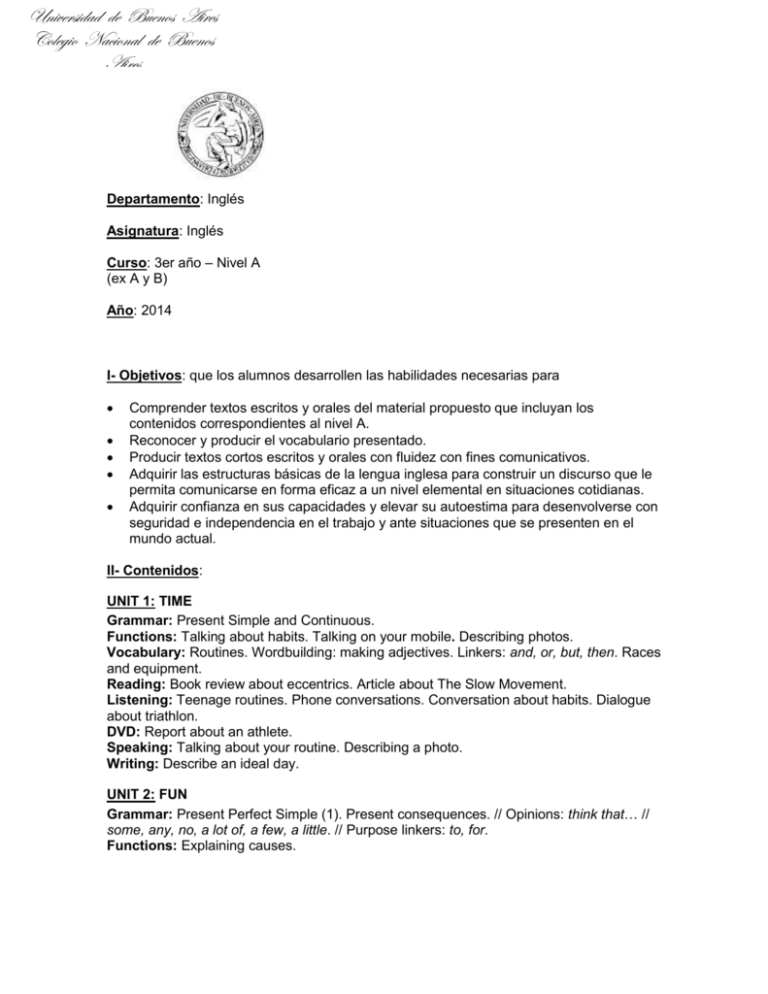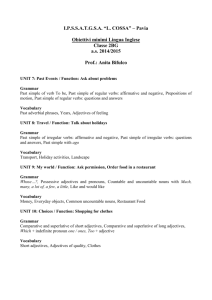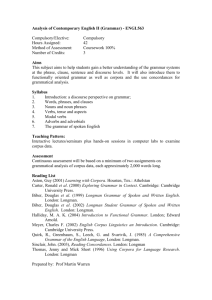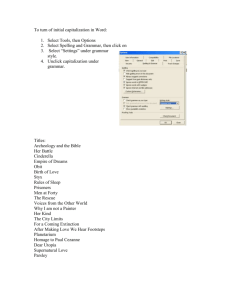
Universidad de Buenos Aires
Colegio Nacional de Buenos
Aires
Departamento: Inglés
Asignatura: Inglés
Curso: 3er año – Nivel A
(ex A y B)
Año: 2014
I- Objetivos: que los alumnos desarrollen las habilidades necesarias para
Comprender textos escritos y orales del material propuesto que incluyan los
contenidos correspondientes al nivel A.
Reconocer y producir el vocabulario presentado.
Producir textos cortos escritos y orales con fluidez con fines comunicativos.
Adquirir las estructuras básicas de la lengua inglesa para construir un discurso que le
permita comunicarse en forma eficaz a un nivel elemental en situaciones cotidianas.
Adquirir confianza en sus capacidades y elevar su autoestima para desenvolverse con
seguridad e independencia en el trabajo y ante situaciones que se presenten en el
mundo actual.
II- Contenidos:
UNIT 1: TIME
Grammar: Present Simple and Continuous.
Functions: Talking about habits. Talking on your mobile. Describing photos.
Vocabulary: Routines. Wordbuilding: making adjectives. Linkers: and, or, but, then. Races
and equipment.
Reading: Book review about eccentrics. Article about The Slow Movement.
Listening: Teenage routines. Phone conversations. Conversation about habits. Dialogue
about triathlon.
DVD: Report about an athlete.
Speaking: Talking about your routine. Describing a photo.
Writing: Describe an ideal day.
UNIT 2: FUN
Grammar: Present Perfect Simple (1). Present consequences. // Opinions: think that… //
some, any, no, a lot of, a few, a little. // Purpose linkers: to, for.
Functions: Explaining causes.
Vocabulary: Free time. Modifiers: very, quite. Vague language: like, sort of, kind of, etc.
Reading: Dialogue about films. Computer game adverts. Article about a festival.
Reading / Writing: An invitation.
Listening: People’s hobbies. Short dialogues explaining causes. Radio interview about
gaming. Phone messages.
Speaking: Talking about your hobbies. Describing a photo.
Writing: Text organization. Descriptions.
Culture Choice 1: Poem: Talking After Christmas Blues.
Project: Describe a festival.
UNIT 3: MONEY
Grammar: Present Perfect Simple (2). Indefinite past. Ever / never, already / yet. //
Adjective order.
Functions: Talking about experiences. Shopping.
Vocabulary: Money. Quantities: a bit of, a pair of, etc. Products.
Reading: Article about saving money. Article about a shop.
Listening: Money habits. Dialogues about experiences. Interview about markets.
Speaking: Talking about money. Dialogue in a market.
Writing: An advert.
UNIT 4: STORIES
Grammar: Past Simple and Continuous. Adjectives and prepositions. Present Perfect
Simple and Past Simple.
Functions: Telling an anecdote.
Vocabulary: Stories. Multi-part verbs.
Reading: A ghost story. The story of an escape. Article about a love story.
Listening: Descriptions of films/books. Anecdotes.
Speaking: Telling stories. Talking about books and films. Pronunciation: Numbers.
Intonation: reactions.
Writing: Text organization, style and linkers (time, manner, opinions). Telling a story.
Culture Choice 2: Story: Little Dorrit.
Project: Life of a famous writer.
UNIT 5: GENERATIONS
Grammar: Present Perfect Simple (3). Present situations. for / since. Contrast linkers.
Functions: Looking back. Giving opinions.
Vocabulary: Families. Compounds. Problems at home.
Reading: Blog. Magazine article with family profiles.
Listening: Family descriptions. Family dialogues. Interview with a psychologist.
DVD: Comedy programme.
Speaking: Talking about families. A family disagreement (Role-play).
Writing: An opinion on a blog.
UNIT 6: MUSIC
Grammar: Modals: have to / not have to, can / can’t, may / may not, must / must not.
Verbs + adjectives.
Functions: Complaining. Agreeing and disagreeing.
Vocabulary: Music. Multi-part verbs.
Reading: Teen website. Article about music festivals. School rules. A formal letter.
Listening: Styles of music. Monologue about music habits. Conversations to complain.
Phone conversation.
Speaking: Talking about music. Discussion about music.
Writing: Organisation and formal style. A formal letter (to a magazine).
Culture Choice 3: Song: The Fields of Athenry.
Project: Presentation of a song.
UNIT 7: HEALTH
Grammar: Will, may and be going to. Predictions.
Functions: Predicting.
Vocabulary: Health. Confusing words. Emergencies.
Reading: Letter page: Health advice. Magazine interview.
Listening: Health experiences. Dialogues with predictions. Interview about emergencies.
DVD: BBC documentary.
Speaking: At the doctor’s (Role-play). Talking about health.
Writing: Linkers for listing: e.g. first, second. Instructions.
UNIT 8: NATURE
Grammar: Zero and First Conditionals. Future Conditional. Time clauses. // The use of “it”.
// “all, most, many, some, no/none” // “another / other”.
Functions: Negotiating. Suggesting.
Vocabulary: Environment. Multi-part verbs.
Reading: Article about cane toads. Newspaper articles. Article about bees.
Reading / Writing: A Formal Letter (Letter of enquiry).
Listening: Radio interview about nature. Negotiations. Travel programme. Conversation
about survival.
Speaking: Suggestions and short questions. Talking about your environment. Arrange a
weekend (Role-play).
Writing: Formal Style.
Culture Choice 4: Story: Moby Dick, by Herman Melville.
Projects: - An animal. - The environment.
III- Bibliografía Obligatoria: Según lo indicado por cada profesor/a
-Harris, M and Mower, D. New Opportunities Elementary Student´s Book. (2006)
Pearson-Longman. New York.
-Harris, M and Mower, D. New Opportunities Elementary. Language Power Book (2006).
Pearson Longman. New York.
- Murphy, R. “English Grammar in Use. Intermediate” (1997) CUP. Cambridge.
- New Opportunities Pre-Intermediate by Michael Harris, David Mower & Anna
Sikorzynska
Student´s and Workbook. Pearson Longman.
CHOICES – Pre-Intermediate, by Michael Harris and Anna Sikorzynska. Pearson.
Units 1 to 8.
Students’ Book
Language Choice
- Workbook
-
Extensive Reading: Según lo indicado por cada profesor
Hamlet, by William Shakespeare. Level 3. Retold by Chris Rice. Penguin.
The Life and Times of Shakespeare, by Chiara Pizzorno. Black Cat Publishing.
The Ring, Stage 3.
Three Adventures of Sherlock Holmes, by Sir Arthur Conan Doyle. Longman
Classics. Stage 4.
Reading: “A Boy´s Best Friend” by I. Asimov in “Sweet and Sour”.
: “Two Thanksgiving Day Gentlemen” (adapted from The Trimmed Lamp by O. Henry) in
“Complete Course in English”.
: “A Day´s Wait” by E. Hemingway in “The Splintering Frame”
-Readers: ‘The picture of Dorian Gray’ by Oscar Wilde
‘The Great Gatsby’ by Scott Fitzgerald.
-‘The Canterville ghost’ by Oscar Wilde
DEAD MAN’S SHOES & OTHER DETECTIVE STORIES. Longman Simplified English
Series.
IV- Bibliografía de consulta y/o complementaria:
The Heinemann Elementary English Grammar, by Digby Beaumont.
MACMILLAN.
Essential Grammar in Use, by Raymond Murphy. Cambridge
University Press.
New Opportunities. Pre-Intermediate, by Michael Harris, David
Harris and Anna Sikorzynska. Pearson Longman.
Grammarway 1, by Jenny Dooley & Virginia Evans. Express
Publishing.
Grammar Time 2, by Sandy Jervis. Longman.
Newspaper and magazine articles.
Bibliografía de Consulta
-Dixon, R. “Complete Course in English 4” (2000) Prentice Hl Regents, Englewood Cliffs.
UK.
-“Discovering Fiction” Student´s Book 1. Cambridge University Press (1997) Cambridge.
UK.
-Mignani, A. “Sweet and Sour”. ( 2001) Black Cat Pusblishing- Cibed. Canterbury.
-Mignani, A. “The Splintering Frame”. (2001) Black Cat Publishing. Cideb.Canterbury
-English Grammar at http://www.edufind.com/english/grammar/grammar_topics.php
ENGLISH GRAMMAR IN USE (Intermediate). By Raymond Murphy. Cambridge University
Press.
Departamento: Inglés
Asignatura: Inglés
Curso: 3ero B (ex nivel C y D)
Año: 2014
I- Objetivos: se espera que los alumnos logren.
La incorporación de contenidos que le permitan manejar satisfactoriamente la lengua inglesa en un nivel intermedio/avanzado en situaciones cotidianas y vinculadas a las unidades programadas.
Desarrollar la expresión y la comprensión oral y escrita utilizando correctamente
las estructuras de la lengua.
Tengan buena pronunciación, fluidez y seguridad en la conversación.
Adquieran autonomía en el manejo de situaciones vinculadas a los temas propuestos
II- Contenidos:
Unidad 1: Adventure
Skills:
Vocabulary: word building, extreme sports, cognates, opinions
Reading: non-fiction about Scott´s expedition (true/false questions), biodata about
travellers, adverts, Country factfile (Canada)
Reading Strategies: multiple choice questions, matching
Speaking: about photos, information gap, describing and talking about photos, interviewing
partner, choosing a holiday
Speaking strategies: Interaction
Listening: TV programme, interviews, a radio programme, a quiz, biographical data
Listening strategies: preparation
Writing: A personal letter, an informal letter
Grammar: Present Simple, continuous and Perfect
Multi-part verbs
Adjectives and collocations
State and activity verbs
Informal linkers including sentence adverbs (actually, luckily)
Unidad 2: Stories
Skills:
Vocabulary: Key words for texts, modifiers, film genres, jargon, and crime related words
Reading: Short Story by H.G. Wells, autobiographical extract, biographical and historical
background
Reading Strategies: paragraph gaps, true/ false questions
Speaking: narrating, giving opinions about films and photos, telling a film plot
Speaking strategies: Interaction, dealing with mistakes
Listening: recorded phone message, dialogues about films, a film plot, a folk song
Listening strategies: preparation, matching, listening for important words
Writing: An adventure story (narrative)
Grammar:
Past Perfect, Past Simple and Past Continuous
Sequence linkers (after, by the time, suddenly, just then, etc.)
Used to and would
Unidad 3: Travel
Vocabulary: transport problems, collocation, air travel, travel words
Reading: Travel literature extract by Bill Bryson, a leaflet
Reading Strategies: Sentence gaps,
Speaking: discussing means of transport, talking about a photo, tourist problems
Speaking strategies: Interaction, role-plays, talking about a photo
Listening: Airport announcements, tourist problems, a radio programme
Listening strategies: matching information and dialogues, completing sentences
Writing: a report
Grammar:
Present Perfect Simple and Continuous
Multi-part verbs
Addition and contrast (in addition, plus, although, however, on the other hand)
Pronouns
Articles
Unidad 4: The Media
Vocabulary: Compound adjectives, disasters, media words
Reading: Newspaper extracts, Internet news, Profile of Elton John
Reading Strategies: matching true/false questions, dealing with cultural references
Speaking: News story, discussion (topics for presentations),
Speaking strategies: Interaction, expressing opinions, discussing a photo/extracts, preparing
for discussion based on stimulating material
Listening: radio programme, a discussion about TV, a TV debate, a pop song
Listening strategies: matching information and dialogues, listening for specific information
Writing: a review of a film or a TV programme
Grammar:
The Passive
Multi-part verbs
Contrasting ideas (nevertheless, however, in spite of, although, despite)
Causatives (to have/ get something done)
The adjective
I- Bibliografía Obligatoria: Según lo asignado por cada docente
New Opportunities Pre-Intermediate-Education for Life- Michael Harris,
David Mower
& Anna Sikorzynska
New Opportunities Intermediate- Education for Life- Michael Harris, David Mower &
Anna Sikorzynska Students´book and Power book, Pearson Longman 2006
IV - Bibliografía de consulta y/o complementaria: The Oxford Spanish Dictionary
Spanish – English . English- Spanish. Chief Editors: Beatriz Galimberti Jarman y Joy
Russell Oxford University Press 3rd Edition
V - Extensive Reading :
Romeo and Juliet by William Shakespeare
Hamlet by William Shakespeare
Great Gatsby by F. Scott Fitzgerald.
Programa 3ero ( ex C) TM
EXPECTATIVAS DE LOGRO:
Se espera que el alumno logre:
-Comprender textos orales y escritos de distintas fuentes y géneros correspondientes al
nivel.
-Producir textos orales y escritos teniendo en cuenta registro, estilo y destinatario.
-Seleccionar y emplear el vocabulario y estructuras adecuadas al propósito comunicativo.
-Desarrollar una actitud crítica frente a los materiales propuestos y sus implicancias
culturales y sociales.
-Desarrollar el metalenguaje indispensable en el aprendizaje de un idioma.
UNIDADES DIDÁCTICAS:
Unidad 1
MONEY: (Unit 7 Opportunities Student´s Book)
Vocabulary and common expressions on: Wealth and Poverty.
Linking words: Although, however, but, even though
READING: John Steinbeck: “The Pearl”, “The Breadwinner”
Grammar: Can, Have to, Don´t / doesn´t /have to, Must, Mustn´t, Needn´t
Adjectives: Comparatives and Superlatives
Unit 2
GADGETS: (Unit 8 )
Energy : How to save it and why we waste it. Inventions. Natural resources.
Predictions: Will – Won´t / going to
Multi part verbs( Phrasal and prepositional verbs)
ask for, save up, spend on, pay for
Some, Any, No, Much, Many, A lot (of), Little, A little, Few, A few
OTHER EXPRESSIONS: to be well off, to sleep rough, to be on relief, to be on the dole
READING: H.C Neal´s Who shall dwell?
Ray Bradbury´s The Veldt from The Illustrated Man
Unit 3
COMMUNICATION/ THE MEDIA: Radio, TV,The WEB, VIRTUAL TOURISM
Making a phone call / Leaving a message
Zero Conditional / Conditional Type I / Conditional Type II
Expressions with DO and MAKE
Adjectives and adverbs: e.g Late/ lately- Slow/ slowly
Irregular adverbs: good/ well- hard (adj. and adverb) cf. “Hardly”
Giving advice: Should // Suggestions: Why don´t you...? How about? I suggest your working harder...
READING: Sandra Cisneros´ The House on Mango Street
Danny Santiago´s “The Somebody”
Unit 4
THE SEA (Unit 11)
Going overseas: Reasons for emigrating: Vocabulary
Present Perfect: since- for / already- yet/ just / always/ Never
Contrast with Simple Past: He lived in Paris since 1975. (Then he moved to Brazil)
He´s lived in Paris since 1975 (He still lives there)
Special points to remember: He has gone to... vs He has been to...
Verbs showing starting point: meet, get, move, give, etc. contrasted with Present Perfect:
e.g. I met my friend Stella four years ago. We´ve been friends for three years./ since 2009
Contrast with Spansh: Cuánto hace que tenés esa tablet?
English: How long have you had……? (NOT Simple Present)
READING: Edgar Allan Poe´s “The Maelstrom”
Unit 5
THE MOUNTAINS (Unit 12)
Parts of a mountain. Extreme sports. Taking a risk vs. Running a risk. Survival in extreme circumstances. Shelters.
Passive Voice.
READING: The Little Prince and the Fox (extract from Antoine de St. Exupéry´s book)
Unit 6
DANCE AND MUSIC (Opportunities 13 and 14)
Celtic Rules
Multi part verbs: start off, come across, get up, miss out on, take up, be left out, set up, look out for
Present Progressive with Future Meaning:
e.g I´m sitting for the exam on Wednesday.
The roots of rap
Formal letter
Unit 7
PICTURES (Unit 15)
Different expressions of Art in painting and photography.
READING: Oscar Wilde´s “The Picture of Dorian Gray.”
Eleanor Coerr ´s “The Golden Crane”
Movies, movie stars, biographies.
PRESUPUESTO DE TIEMPO:
Se presupone desarrollar tres unidades y media en cada cuatrimestre.
EVALUACIÓN
Criterios: Para la evaluación se tendrá en cuenta la actitud y conducta en clase, la
colaboración en la presentación de temas, los comentarios críticos del alumno en las
discusiones en clase, la colaboración en tareas con sus pares, la fluidez y
pronunciación en la expresión oral propia del nivel, el manejo de vocabulario y
estructuras apropiadas del nivel, la presentación de tareas en tiempo y forma y su
capacidad de autocorrección.
Instrumentos: Se asignará presentaciones orales sobre temas leídos en clase,
informes de comprobación de lectura, de opinión, tareas de aplicación de temas
gramaticales en contextos apropiados, y dos pruebas escritas por trimestre.
BIBLIOGRAFÍA DEL ALUMNO:
Textos:
Harris Michael Dir, Bille August, 2007, et al, New Opportunities ,Pre-Intermediate,
Pearson- Longman, 2006 .
(Units 7 to 12)
Las lecturas obligatorias son las que figuran en cada unidad.
BIBLIOGRAFÍA DEL DOCENTE
Clark, Stewart & Pointon, Graham, (2003) Word for Word, Oxford
Crowther Jonathan, ed., Oxford Guide to British and American Culture, Oxford
Eastwood, John, (2006), Oxford Practice Grammar, Oxford
Hornby, A. S, (2006), Advanced Learner´s Dictionary, Oxford
COLEGIO NACIONAL DE BUENOS AIRES
DEPARTAMENTO DE INGLÉS, 2014
PROGRAMA DE 3ER AÑO, NIVEL C
(EX NIVEL E Y F)
EXPECTATIVAS DE LOGRO.
Que el alumno:
Desarrolle habilidades en las cuatro áreas lingüísticas para una comunicación natural y eficaz.
Utilice estrategias de comprensión lectora y auditiva para analizar textos originales en forma crítica
e independiente.
A través de los textos, conozca realidades distintas a la propia, que faciliten su vínculo con el otro.
Se integre en grupos de trabajo, siendo capaz de sostener su punto de vista propio en un ámbito de
diversidad.
Elabore textos de distinto tipo utilizando un registro adecuado, cohesión y coherencia que faciliten
su desenvolvimiento tanto en la vida cotidiana como en la comunidad académica.
Manifieste su opinión fluidamente utilizando estructuras avanzadas en la lengua extranjera.
UNITS:
Unit 1:
Revision of Tenses. Tense Mobility. Past tenses used in narrative sequences. The Passive: ways to
blur the presence of the subject in discourse. Revision: Modality.
Revision: Prepositions: movement, position and place.
Prepositions that are also adverbs. Prepositions with more than one word. Prepositional phrases.
Prepositions following adjectives and verbs.
Unit 2:
New Frontiers.
Vocabulary connected to science and technology. Compound words: nouns, adjectives and verbs.
Wordbuilding.
Revision: Future tenses. Expressions to talk about the future.
Future forms (use of Simple Present, Present Continuous, Going to). Future Continuous. Future
Perfect (simple and continuous).
Linking: in order to / so as to / so as not to. So that / as a result.
Unit 3:
The Body.
Discussing health and medical advances. Science. Describing trends. Conditional
sentences (all types). Mixed Conditionals.
Phrasal Verbs approached through the PARTICLE. Verbs with two and three parts.
Transitive and inseparable phrasal verbs. Transitive and separable phrasal verbs.
Intransitive phrasal verbs.
Confusing words. Homophones. Homonyms. Vocabulary, idioms and fixed expressions
connected to science, health and the body.
Writing: Argumentative essays. Generating ideas. Expressing your viewpoints and the opposing
arguments.
Unit 4:
The Self and the Other.
Discrimination. Ableism. Sexism. Racism. Classism. Xenophobia.
Unit 5:
Discussing journeys and ways of travelling. Migration. Verb patterns: verbs followed by
gerunds and infinitives (TO and bare). Talking about past habits: used to and would.
Get/Be used to. Prepositions indicating order and direction. Wordbuilding.
Phrasal verbs in fixed expressions. Vocabulary, idioms and fixed expressions connected
to travelling and journeys. Proverbs.
UNIT 6
Society and Conflict.
Discussing social issues. Society in the past and in the present. Describing trends. Rich
Language. Complex sentences. Persuasion: formal and informal. Written and spoken
English. Making suggestions. Expressing regret (I wish, if only, I regret). Expressions
used to express criticism. Refusing. Suggesting. Threatening and contradicting.
Backshifting (Had I done that…, Should you see him…). Emphatic Structures. Cleft
Sentences.
Word Families. Word formation. Vocabulary and idioms connected to crime and
punishment. Vocabulary and idioms connected to money, work and employment.
Writing: Discursive essays. Coherence and Cohesion. Lexical cohesion. Other cohesive
devices. Use of reference. Ambiguity avoidance. Lexical choice. Punctuation. Register.
Editing your work. Including long and short quotations. Citing bibliography. .Film
analysis (basic elements). Setting (time and place), atmosphere, characters, themes,
symbols.
Unit 7:
Globalization.
The Great Gatsby by F. Scott Fitzgerald. Analysis of selected vocabulary. Literary analysis: setting
(time and place), atmosphere, characters, themes, symbols.
All My Sons by Arthur Miller. Analysis of selected vocabulary. Literary analysis: setting (time and
place), atmosphere, characters, themes, symbols.
CRITERIO de EVALUACIÓN
Se tendrá en cuenta:
El trabajo en el aula y la responsabilidad para con la materia.
La participación en clase y la lectura y análisis de los textos.
Las pruebas escritas y orales.
Los trabajos prácticos, orales y escritos, sean individuales o grupales.
NOTA: En todos los casos, se hará hincapié en el proceso de cada alumno en particular, más que en
los resultados finales.
En las obras literarias se tendrá en cuenta: Literary analysis: setting (time and place),
atmosphere, characters, themes, symbols.
INSTRUMENTOS
La evaluación será continua, a partir de los debates, el desarrollo de las clases y el monitoreo del
progreso de cada alumno.
Por otra parte, se evaluará a los alumnos mediante pruebas de cada uno de los temas trabajados en
clase.
Así también, se realizarán un mínimo de dos (2) trabajos prácticos por trimestre y una evaluación
trimestral integradora.
En el tercer trimestre, los alumnos realizarán una monografía sobre un tema a elección, que tendrá
como propósito vincular la literatura con el cine, reafirmando el objetivo de desarrollar su
pensamiento crítico.
Finalmente, se llevará un control de cada alumno sobre su desempeño en el análisis de los trabajos
vinculados al cine y la literatura.
BIBLIOGRAFÍA
Libro de Texto: Según lo asignado por cada docente
Harris, Mower and Sikorzynska Anna. New Opportunities Upper- Intermediate. Students’ Book.
England: Pearson Longman, 2006.
Harris, Mower and Sikorzynska Anna. New Opportunities Upper- Intermediate. Powerbook.
England: Pearson Longman, 2006.
De lectura del alumno: Según lo indicado por el profesor
Fitzgerald, F. Scott. The Great Gatsby. England: Penguin Popular Classics, 1994.
Miller, Arthur. All My Sons. England: Longman Group, 2007.
Williams, Tennessee. The Glass Menagerie. England: Penguin Books, 1962.
Zephaniah, Benjamin. Face. London: Bloomsbury, 1999.
“Hills like White Elephants” and “The Short Happy Life of Francis Macomber” by Ernest
Hemingway. Analysis of selected vocabulary.
The Glass Menagerie by Tennessee Williams.
“Robert and the Dog” by Ken Saro-Wiwa.
Wood, M. “Disappearing”
Blake, W. “The Chimney Sweeper” en Songs of Innocence
Santiago, D. “The Somebody”
Albee, E. The American Dream
The Island (Dir. M. Bay)
Material compilado por la Profesora del curso (Prof. Carmosino) con actividades para el trabajo de
las 4 macro-habilidades y de los contenidos lexicales y gramaticales para cada unidad didáctica. Las
actividades y los textos orales y escritos son seleccionados de la libros detallados en la bibliografía
del docente.
De consulta del alumno
Evans, Virginia. Round-up 6. England: Pearson Longman, 1999.
Vince, Michael. First Certificate Language Practice. Oxford: Heinemann, 1993.
1) ADVANCED GOLD. COURSEBOOK. By Richard Acklam & Sally Burgess. Pearson
Longman.
2) TWELVE RED HERRINGS. Harper Collins.
3) CRIME NEVER PAYS (Anthology). Oxford University Press.
4) SOMEONE LIKE YOU (Anthology). Cambridge University Press.
- New Opportunities Intermediate by Michael Harris, David Mower & Anna Sikorzynska
Student´s and Workbook. Pearson Longman.
- New Opportunities Upper Intermediate by Michael Harris, David Mower & Anna Sikorzynska
Student´s and Workbook. Pearson Longman
-Readers: ‘The catcher in the Rye’ by Salinger
-Short stories: ‘Way up to heaven’ by Roal Dahl
‘October game’ by Ray Bradbury
‘Lizzie Borden’
‘What life means to me’ by Jack London
-Audio: New Opportunities Intermediate and Upper Intermediate
-Películas: ‘Scoop’
Websites
http://www.youtube.com
http://www.m-w.com
http://www.thefreedictionary.com
http://visual.merriam-webster.com
http://www.cuevana.tv/
Películas
The Island (Dir. M. Bay)
Juno by Jason Reitman.
Transamerica by Duncan Tucker.
American Beauty by Sam Mendes.
V for Vendetta by James Mc Teigue.
Babel by Alejandro González Iñárritu.
‘Scoop’ by Woody All
Se solicitará permiso de los padres en algunos casos
SIDE, R & WELLMAN, G (1999). Grammar and vocabulary for Cambridge Advanced
and Proficiency. Longman.
WALTON, R. & O´CONNEL, S (1999). Focus on Advanced English C.A.E- Grammar Practi.ce.
Longman.
CAPEL, A. & SHARP, W. (2002) Objective Proficiency. Cambridge. University.
TOOLE, J. K. (1980). A confederacy of Dunces. New York, NY: Grove Press
CHESTERTON, GK, (1986). The Man Who was Thursday, Penguin books.
Del docente:
Carter and M. McCarthy (2006). Cambridge Grammar of English. A Comprehensive Guide. Spoken
and Written English Grammar and Usage. Cambridge: Cambridge University Press.
Evans, V. et at. (2008) Upstream. Advanced. UK: Express Publishing.
Harmer, J. & R. Rossner (1992). More Than Words. Book 1. London: Longman.
Hook, J. N. (1981) Two-Word Verbs in English. New York: Harcourt Brace & Company.
McAndrew, R. and R. Martinez (2001). Taboos and Issues. Boston: Thomson Heinle Language
Teaching Publications.
McCarthy, M. & F. O’Dell (1994) English vocabulary in Use. Upper-intermediate & Advanced.
Cambridge: CUP
Moutsou, E. and S. Parker (1996). Enter the World of Grammar. Book 5. London: MM
Publications.
O’Neill, R. et al. (1997). New Success at First Certificate. Oxford: Oxford University Press.
Stanton, A. et al. (1999). Fast Track to CAE. Harlow: Longman.
Vince, M. (2003). Advanced Language Practice. Oxford: Macmillan.
Yule, G. (2009). Oxford Practice Grammar Advanced. Oxford: Oxford University Press.
Bibliografía de consulta y/o complementaria:
GOTTAU, V (2008) .The Little Book of Tenses. Editorial Nuevos Tiempos. Buenos Aires.
CARLING, M. (2003). Grammar Time 6. Longman
Web links:
http://www.theguardian.com/uk
http://www.haaretz.com/
http://www.washingtonpost.com/









